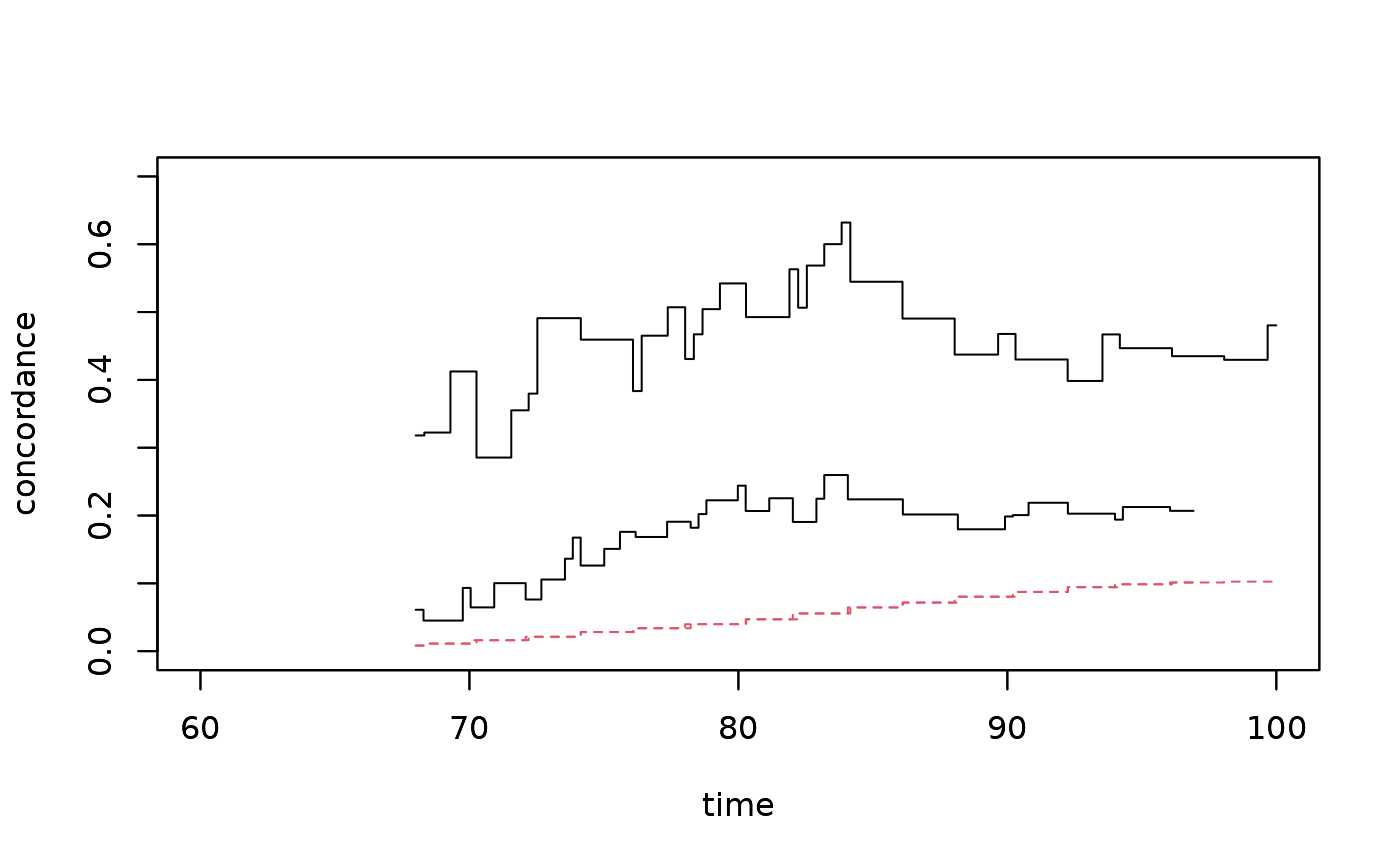
Estimates the casewise concordance based on Concordance and marginal estimate using timereg and performs test for independence
Source:R/casewise.R
casewise.test.RdEstimates the casewise concordance based on Concordance and marginal estimate using timereg and performs test for independence
Details
Uses cluster based conservative standard errors for marginal and sometimes only the uncertainty of the concordance estimates. This works prettey well, alternatively one can use also the funcions Casewise for a specific time point
Examples
## Reduce Ex.Timings
library("timereg")
data("prt",package="mets");
prt <- force.same.cens(prt,cause="status")
prt <- prt[which(prt$id %in% sample(unique(prt$id),7500)),]
### marginal cumulative incidence of prostate cancer
times <- seq(60,100,by=2)
outm <- timereg::comp.risk(Event(time,status)~+1,data=prt,cause=2,times=times)
cifmz <- predict(outm,X=1,uniform=0,resample.iid=1)
cifdz <- predict(outm,X=1,uniform=0,resample.iid=1)
### concordance for MZ and DZ twins
cc <- bicomprisk(Event(time,status)~strata(zyg)+id(id),
data=prt,cause=c(2,2))
#> Strata 'DZ'
#> Strata 'MZ'
cdz <- cc$model$"DZ"
cmz <- cc$model$"MZ"
### To compute casewise cluster argument must be passed on,
### here with a max of 100 to limit comp-time
outm <- timereg::comp.risk(Event(time,status)~+1,data=prt,
cause=2,times=times,max.clust=100)
cifmz <- predict(outm,X=1,uniform=0,resample.iid=1)
cc <- bicomprisk(Event(time,status)~strata(zyg)+id(id),data=prt,
cause=c(2,2),se.clusters=outm$clusters)
#> Strata 'DZ'
#> Strata 'MZ'
cdz <- cc$model$"DZ"
cmz <- cc$model$"MZ"
cdz <- casewise.test(cdz,cifmz,test="case") ## test based on casewise
cmz <- casewise.test(cmz,cifmz,test="conc") ## based on concordance
plot(cmz,ylim=c(0,0.7),xlim=c(60,100))
par(new=TRUE)
plot(cdz,ylim=c(0,0.7),xlim=c(60,100))
 slope.process(cdz$casewise[,1],cdz$casewise[,2],iid=cdz$casewise.iid)
#> $intercept
#> (Intercept)
#> 0.1520835
#>
#> $slope
#> ctime
#> 0.01849925
#>
#> $se.slope
#> (Intercept) ctime
#> 0.06273584 0.04470886
#>
#> $pval.slope
#> ctime
#> 0.6790415
#>
slope.process(cmz$casewise[,1],cmz$casewise[,2],iid=cmz$casewise.iid)
#> $intercept
#> (Intercept)
#> 0.4456058
#>
#> $slope
#> ctime
#> 0.0004679675
#>
#> $se.slope
#> (Intercept) ctime
#> 0.08924422 0.07231706
#>
#> $pval.slope
#> ctime
#> 0.9948369
#>
slope.process(cdz$casewise[,1],cdz$casewise[,2],iid=cdz$casewise.iid)
#> $intercept
#> (Intercept)
#> 0.1520835
#>
#> $slope
#> ctime
#> 0.01849925
#>
#> $se.slope
#> (Intercept) ctime
#> 0.06273584 0.04470886
#>
#> $pval.slope
#> ctime
#> 0.6790415
#>
slope.process(cmz$casewise[,1],cmz$casewise[,2],iid=cmz$casewise.iid)
#> $intercept
#> (Intercept)
#> 0.4456058
#>
#> $slope
#> ctime
#> 0.0004679675
#>
#> $se.slope
#> (Intercept) ctime
#> 0.08924422 0.07231706
#>
#> $pval.slope
#> ctime
#> 0.9948369
#>